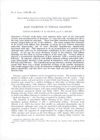Balding Hair Follicle Dermal Papilla Cells Contain Higher Levels of Androgen Receptors Than Those From Non-Balding Scalp
January 1998
in “
Journal of Endocrinology
”

TLDR Cells from balding scalps have more androgen receptors than cells from non-balding scalps.
In the 1998 study by Hibberts, Howell, and Randall, it was discovered that dermal papilla cells from the scalp hair follicles of balding individuals had significantly higher levels of androgen receptors than those from non-balding individuals. The study included 11 participants (10 men and 1 woman) with an average age of 34 years. The androgen receptor content was measured using [³H]mibolerone, and the results indicated that balding cells had 0.06 ± 0.01 fmol/10⁴ cells, which was significantly higher than the 0.04 ± 0.001 fmol/10⁴ cells found in non-balding cells, with a significance of P<0.01. The binding affinity for androgen receptors was similar between balding and non-balding samples, but the maximum binding capacity was significantly higher in balding samples. This supports the idea that androgens may contribute to androgenetic alopecia through their action on the dermal papilla and that cultured dermal papilla cells could be a useful model for studying this condition.










